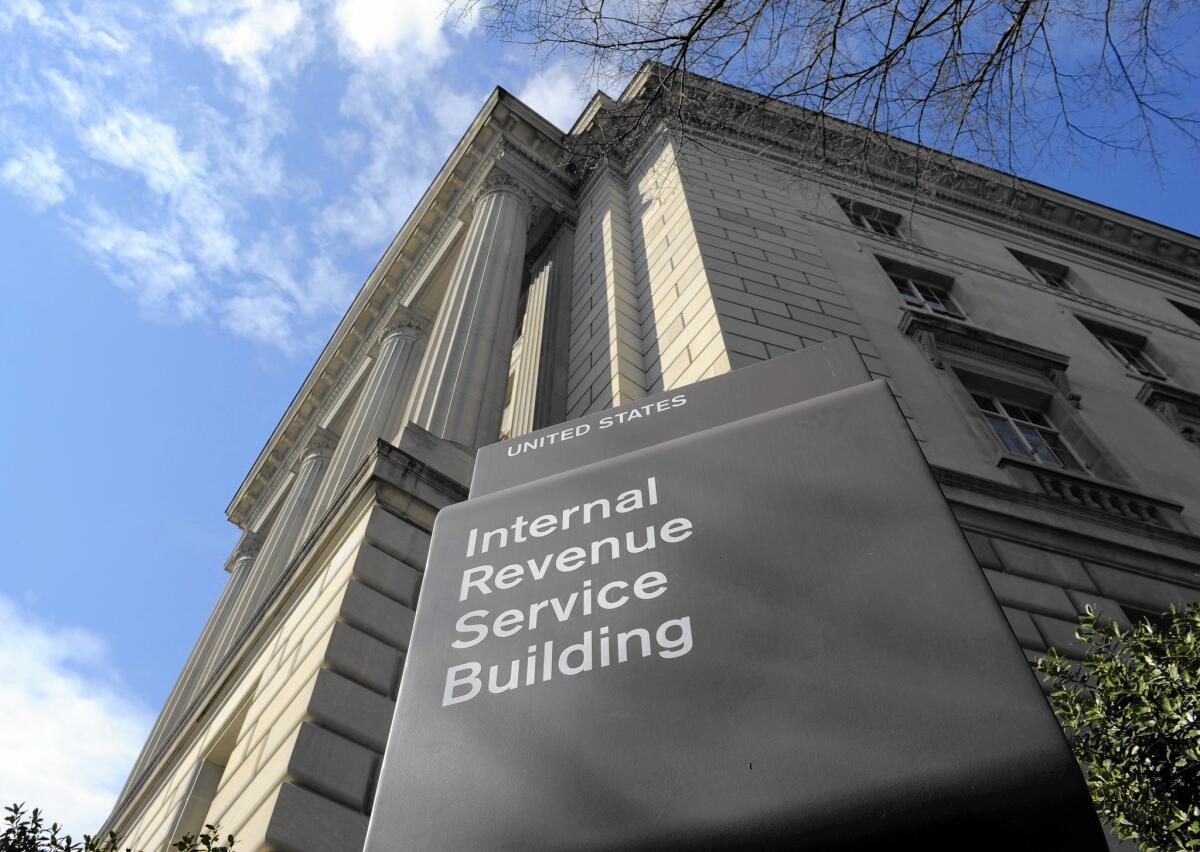Personal finance Q&A: Tax refunds may take longer amid IRS budget cuts

- Share via
Dear Liz: How long is too long for an IRS tax refund to be disbursed? I got my state tax refund in a matter of weeks. The IRS refund has been “under review” for almost five months.
Answer: A sizable surge in tax refund theft as well as a database breach that exposed more than 300,000 taxpayers’ returns have kept the IRS pretty busy. At the same time, big budget cuts have left the agency with fewer people to help with these issues.
Five months is a long wait, but people who have been the victims of refund theft report waiting nine months or more to get their money back.
You can try contacting the IRS directly at (800) 829-1040, although you’re likely to be on hold for quite a while. If you can’t get a response, you can contact the IRS’ Taxpayer Advocate at (877) 777-4778, but be advised its resources have been trimmed as well and it may just refer you back to the IRS.
Dear Liz: I have some questions regarding my brokerage accounts. What happens to my investments there if the brokerage company goes out of business? How much of my investments will I be able to recover and how? Also, does it matter if my accounts are IRAs, Roth IRAs, or conventional brokerage accounts?
Answer: Most brokerages are covered by the Securities Investment Protection Corp., which protects up to $500,000 per eligible account, which includes a $250,000 limit for cash.
Different types of accounts held by the same person can get the full amount of coverage. IRAs, Roth IRAs, individual brokerage accounts, joint brokerage accounts and custodial accounts could each have $500,000 of coverage.
So with an IRA, a Roth and a regular brokerage account, you would have up to $1.5 million in coverage.
If you have a few traditional IRAs at the brokerage, though — say, one to which you contributed and one that’s a rollover from a 401(k) — those two would be combined for insurance purposes and covered as one, with a $500,000 limit.
In addition to SIPC coverage, many brokerages buy additional insurance through insurers such as Lloyds of London to cover larger accounts.
It’s important to understand that SIPC doesn’t cover losses from market downturns. The coverage kicks in when a brokerage goes out of business and client funds are missing.
SIPC is commonly compared to the Federal Deposit Insurance Corp., which protects bank accounts, but there’s an important difference between the two.
The FDIC is backed by the full faith and credit of the U.S. government. SIPC has no such implicit promise that if it’s overwhelmed by claims, the government will come to the rescue.
Dear Liz: Your reply about what to do with a 401(k) after someone leaves a job was off base, in my opinion.
You advised the questioner to leave the 401(k) with the former employer until it could be rolled over to a new 401(k) with a new employer. Wouldn’t it be better to roll over the old 401(k) to an IRA? An IRA offers more control and better investment options than a 401(k).
Answer: More is not necessarily better. Some people appreciate the chance to diversify their investments by using a rollover IRA. Many others, however, have no need for thousands of investment options and in fact could be paralyzed by so many choices.
The investment options available for IRAs also can be more expensive than what’s typically available in large company plans. These 401(k)s often offer institutional funds with low expense ratios that are unavailable to retail investors.
Finally, 401(k)s have better protection from creditors than IRAs if the worker is sued or files for bankruptcy, although that won’t be an issue for the vast majority of savers.
People can protect an unlimited amount of money in a 401(k), while IRA protection is limited to $1,245,475.
Keeping an account with an old employer, or rolling it over to a new one, won’t be the right solution for everyone. But neither is an IRA rollover—despite what brokerage houses that profit from IRA rollovers may tell you.
Questions may be sent to Liz Weston, 3940 Laurel Canyon, No. 238, Studio City, CA 91604, or by using the “Contact” form at asklizweston.com. Distributed by No More Red Inc.
More to Read
Inside the business of entertainment
The Wide Shot brings you news, analysis and insights on everything from streaming wars to production — and what it all means for the future.
You may occasionally receive promotional content from the Los Angeles Times.









